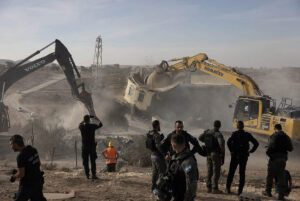The entire history of Zionism’s injustices, in one Bedouin village

Israeli police surround and destroy the mosque in Umm Al-Hiran, 14 November 2024.
Orly Noy writes in +972 on 20 November 2024:
Last week, the State of Israel hung the scalp of another Palestinian community on its belt after completing the demolition of Umm Al-Hiran. On the morning of Nov. 14, hundreds of police stormed the Bedouin village — which is located in the Negev/Naqab desert, in southern Israel — accompanied by special forces officers and helicopters. The residents, Israeli citizens who had long feared that this day would come, had already self-demolished most of the structures in the village to avoid having to pay large fines. All that was left for police to destroy was the mosque.
Just like that, two and a half decades of legal struggle to save the village came to an end, and the residents were rendered homeless. If you want to understand the entire history of Zionism’s injustices against Palestinians — with all the discrimination, racism, dispossession, and violence, grounded in a vision of Jewish supremacy and a concomitant obsession with demographic engineering — you need look no further than Umm Al-Hiran.
In Israeli-Jewish discourse, the destruction of a Bedouin community barely raises eyebrows, let alone makes headlines. After all, it was an “unrecognized village” — a linguistic device Israel deploys to portray Bedouin citizens as invaders in their own lands. The Israeli public perceives the systematic destruction of these communities as a mere crackdown on rulebreakers. But not only were the residents of Umm Al-Hiran not invaders, they were moved there by the state itself.
Before Israel was established, the community that became Umm Al-Hiran lived in the northwestern Negev. In 1952, Israel’s military government forcibly displaced them further east in order to expropriate their land for the construction of Kibbutz Shoval. Four years later, the state decided to uproot them again, pushing them to an area just inside the Green Line, near the southwestern tip of the West Bank, where they remained until last week.
